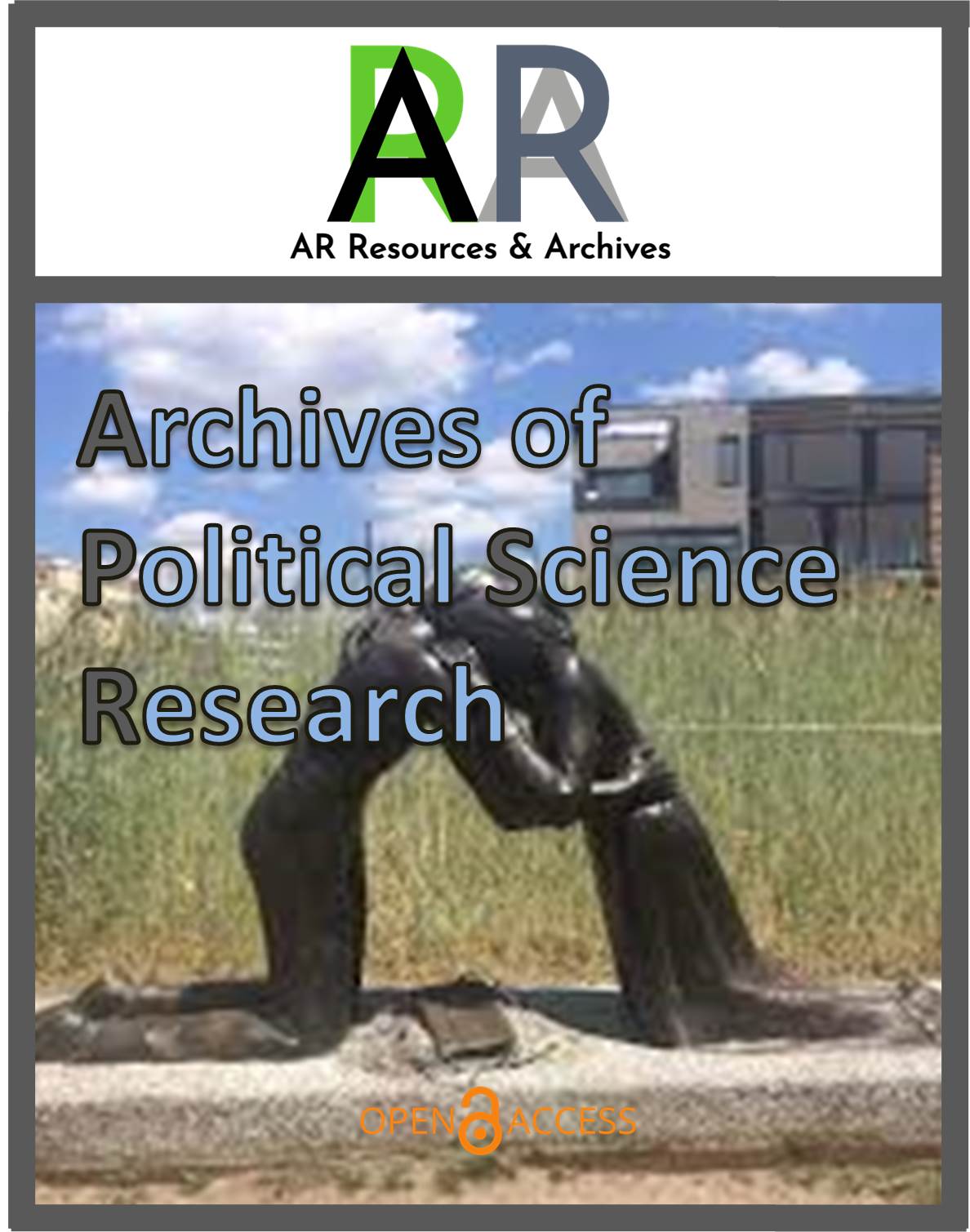Full Length Research Paper
Fundamentalism, Terrorism and Democracy: The 2003 Iraq War and the Extremism of Ideologies
Ancietos Mwansa
Article Number - 62668F4C86692 | Vol. 3(1), pp. 1-15, April 2022 |
Received: 9 April 2021 | Accepted: 11 April 2022 | Published: 30 April 2022
Copyright © 2024 Author(s) retain the copyright of this article.
This article is published under the terms of the Creative Commons Attribution License 4.0.

Abstract
This paper
discusses fundamentalism as a root cause of terrorism and seeks to establish
whether the export of democracy to the Middle East - to the point of violent
regime change - can be explained as democratic extremism. The regime change in
Iraq is used as a reference point. The paper focuses on fundamentalism and
gives an account that will form the premise for the judgement as to whether the
same way that fundamentalism plays a role in the manifestations of terrorism is
the same way the use of force to change sovereign foreign regimes must be
understood. Also, extremism will be
defined vis-Ã -vis the export of democracy through war to the Middle East with
particular focus on the 2003 US invasion of Iraq and the repercussions thereof.
The purpose of this two-pronged discussion is to reach a point of culmination
and interaction between the actions of terrorist groups such as Al-Qaeda and
most recently Isis, and the push by the West, most notably the US and its
allies to advance democracy in the Middle East, and create the nexus between a
clash of ideologies rooted in extensive actions taken to defend or propagate
them. Keywords: Democracy, Fundamentalism, Extremism,
Terrorism, War. Â
Â
References
Armstrong,
K. (2000). The Battle for God: Fundamentalism in Judaism, Christianity and
Islam. New York: Harper-Collins. https://www.biblio.com/the-battle-for-god-by-armstrong-karen/work/15111
Beit-Hallahmi,
B. (2001). Fundamentalism. In J. Krieger (ed.) The Oxford Companion to Politics of the World. Oxford: Oxford
University Press.
Buzan, B. (2004).
From International to World Society? English School Theory and The Social
Structure of Globalisation. Cambridge
Studies in International Relations, 1(95). Cambridge University Press,
Cambridge, DOI: https://doi.org/10.1017/CBO9780511616617
Cebrian,
J. L. (2004). The Democratic Fundamentalism. Taurus, Madrid, pp 179. [DL M 51590-2003].
Haynes, J.
(2005). Islamic Militancy in East Africa. Third World Quarterly, 26(8),
1321–1339. http://www.jstor.org/stable/4017717
Hellmich, C. &
Redig, A. J. (2007). The Question is When: The Ideology of Al Qaeda and the
Reality of Bioterrorism. Studies in
Conflict & Terrorism, 30(5), 375-396,
https://doi.org/10.1080/10576100701258593
Hinnebusch
R. (2007). The US Invasion of Iraq: Explanations and Implications, Critique. Critical Middle Eastern Studies, 16(3), 209-228,
https://doi.org/10.1080/10669920701616443
Hurrell, A.
(2002). ‘There are no Rules’ (George W. Bush): International order after 9/11. International Relations 16(2), 185-204,
DOI: http://dx.doi.org/10.1177/0047117802016002002
International
Commission of Jurists (n/d). Iraq - ICJ Deplores Moves Toward a War of
Aggression on Iraq.
https://web.archive.org/web/20030407232423/http://www.icj.org/news.php3?id_article=2770&lang=en
Klein, M.
(1946). Notes on Fundamentalist Mechanisms. International
Journal of Psychoanalysis, 27, 99-110.
Marty, M.
E. & Appleby, S. R. (1993). Fundamentalisms and Society: Reclaiming the
Sciences, the Family and Education. Chicago: University of Chicago Press,
https://press.uchicago.edu/ucp/books/book/chicago/F/bo3644305.html
Meir Amit
Intelligence and Terrorism Information Centre (2014). Isis: Portrait of a
Jihadi Terrorist Organization. https://www.terrorism-info.org.il/en/20733/
Menon, R (2016). The Conceit of humanitarian
intervention. Oxford University Press adapted from Grahame Fuller’s review at: http://grahamefuller.com/the-conceit-of-humanitarian-intervention-by-rajan-menon/
Moghadam,
A. (2008). The Salafi-Jihad as a religious ideology. Combating Terrorism Center, 1(3), https://ctc.westpoint.edu/the-salafi-jihad-as-a-religious-ideology/
Pagels, E.
(1995). The Origins of Satan. Allen Lane: The Penguin Press.
Pape, R.
A. (2006). Dying to Win: The strategic logic of suicide terrorism. New York: Random House Trade Paperbacks.
Ritchie, H., Hasell, J., Appel, C. & Roser, M. (2013). Terrorism. Our
World in Data, https://ourworldindata.org/terrorism
Santos, M.
H. C., & Teixeira, U. T. (2013). The essential role of democracy in the
Bush Doctrine: the invasions of Iraq and Afghanistan. Revista Brasileira de PolÃtica Internacional, 56(2), 131-156,
https://doi.org/10.1590/S0034-73292013000200008
Segal, H.
(1957). Notes on Symbol Formation Oxford: Oxford University Press.
https://pep-web.org/browse/document/paq.027.0600b?page=P0600
Simpson,
G. (2005). The War on Iraq and International Law. Melbourne Journal of International Law Vol. 6, http://www.austlii.edu.au/au/journals/MelbJlIntLaw/2005/7.html
Stern, J. & McBride, M. K. (2013). Terrorism after the 2003 Invasion of Iraq. Watson Institute of International and Public
Affairs, Brown University,
https://watson.brown.edu/costsofwar/papers/2013/terrorism-after-2003-invasion-iraq
The Encyclopaedia Britannica (1999).
Walt, S.
M. (2018). Bullies don’t win at diplomacy. Foreign
Policy, https://foreignpolicy.com/2018/06/07/bullies-dont-win-at-diplomacy/
Weiss, B.
(2011). The Tyrannies Are Doomed’.
Princeton NJ: The Wall Street Journal, https://www.wsj.com/articles/SB10001424052748703712504576234601480205330
Young, R
(2003). Fundamentalism. California: Routledge.
Â
Authors
Ancietos Mwansa
Political and Administrative Studies Department, Mulungushi University,
Kabwe, Zambia. Email: [email protected], +260978806168
How to Cite this Article
Mwansa, A. (2022). Fundamentalism, Terrorism and Democracy:
The 2003 Iraq War and the Extremism of Ideologies. Archives of Political Science Research, 3(1), 1-15.
Â
Â
Full-Text (PDF)
View / DownloadBack to Articles
Back to Journals
ISSN: 2971-7744 (Online)
DOI:
Start Year: 2020
Published Articles: